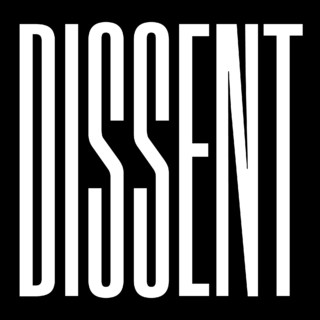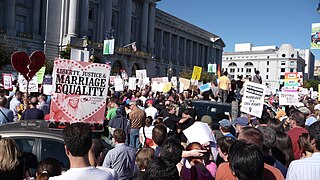Egalitarianism, or equalitarianism, is a school of thought within political philosophy that builds on the concept of social equality, prioritizing it for all people. Egalitarian doctrines are generally characterized by the idea that all humans are equal in fundamental worth or moral status. As such, all citizens of a state should be accorded equal rights and treatment under the law. Egalitarian doctrines have supported many modern social movements, including the Enlightenment, feminism, civil rights, and international human rights.
Right-wing politics describes the range of political ideologies that view certain social orders and hierarchies as inevitable, natural, normal, or desirable, typically supporting this position based on natural law, economics, authority, property or tradition. Hierarchy and inequality may be seen as natural results of traditional social differences or competition in market economies.
The left–right political spectrum is a system of classifying political positions, ideologies and parties, with emphasis placed upon issues of social equality and social hierarchy. In addition to positions on the left and on the right, there are centrist and moderate positions, which are not strongly aligned with either end of the spectrum.
The Port Huron Statement is a 1962 political manifesto of the American student activist movement Students for a Democratic Society (SDS). It was written by SDS members, and completed on June 15, 1962, at a United Auto Workers (UAW) retreat outside of Port Huron, Michigan, for the group's first national convention. Under Walter Reuther's leadership, the UAW paid for a range of expenses for the 1962 convention, including use of the UAW summer retreat in Port Huron.

Buddhist socialism is a political ideology which advocates socialism based on the principles of Buddhism. Both Buddhism and socialism seek to provide an end to suffering by analyzing its conditions and removing its main causes through praxis. Both also seek to provide a transformation of personal consciousness to bring an end to human alienation and selfishness.

Michael Laban Walzer is an American political theorist and public intellectual. A professor emeritus at the Institute for Advanced Study (IAS) in Princeton, New Jersey, he is editor emeritus of Dissent, an intellectual magazine that he has been affiliated with since his years as an undergraduate at Brandeis University. He has written books and essays on a wide range of topics—many in political ethics—including just and unjust wars, nationalism, ethnicity, Zionism, economic justice, social criticism, radicalism, tolerance, and political obligation. He is also a contributing editor to The New Republic. To date, he has written 27 books and published over 300 articles, essays, and book reviews in Dissent, The New Republic, The New York Review of Books, The New Yorker, The New York Times, Harpers, and many philosophical and political science journals.

Dissent is an American Left intellectual magazine edited by Natasha Lewis and Timothy Shenk and founded in 1954. The magazine is published by the University of Pennsylvania Press on behalf of the Foundation for the Study of Independent Social Ideas. Former co-editors include Irving Howe, Mitchell Cohen, Michael Walzer, and David Marcus.
The European New Right (ENR) is a far-right movement which originated in France as the Nouvelle Droite in the late 1960s. Its proponents are involved in a global "anti-structural revolt" against modernity and post-modernity, largely in the form of loosely connected intellectual communities striving to diffuse a similar philosophy within European societies.
Politics in Chicago through most of the 20th century was dominated by the Democratic Party. Organized crime and political corruption were persistent concerns in the city. Chicago was the political base for presidential nominees Stephen Douglas (1860), Adlai Stevenson II, and Barack Obama, who was nominated and elected in 2008.
Left-libertarianism, also known as left-wing libertarianism, or social libertarianism, is a political philosophy and type of libertarianism that stresses both individual freedom and social equality. Left-libertarianism represents several related yet distinct approaches to political and social theory. Its classical usage refers to anti-authoritarian varieties of left-wing politics such as anarchism, especially social anarchism, communalism, and libertarian Marxism, collectively termed libertarian socialism. A portion of the left wing of the green movement, including adherents of Murray Bookchin's social ecology, are also generally considered left-libertarian.

Christian egalitarianism, also known as biblical equality, is egalitarianism based in Christianity. Christian egalitarians believe that the Bible mandates gender equality and equal responsibilities for the family unit and the ability for women to exercise spiritual authority as clergy. In contrast to Christian complementarianists and Christian patriarchists, proponents of Christian egalitarianism argue that Bible verses often used to justify patriarchal domination in gender roles are misinterpreted. Egalitarians believe in a form of mutual submission in which all people submit to each other in relationships and institutions as a code of conduct without a need for hierarchical authority.
Prefigurative politics are the modes of organization and social relationships that strive to reflect the future society being sought by the group. According to Carl Boggs, who coined the term, the desire is to embody "within the ongoing political practice of a movement [...] those forms of social relations, decision-making, culture, and human experience that are the ultimate goal". Besides this definition, Leach also gave light to the definition of the concept stating that the term "refers to a political orientation based on the premise that the ends a social movement achieves are fundamentally shaped by the means it employs, and that movement should therefore do their best to choose means that embody or prefigure the kind of society they want to bring about". Prefigurativism is the attempt to enact prefigurative politics.
Eleanor Burke Leacock was an anthropologist and social theorist who made major contributions to the study of egalitarian societies, the evolution of the status of women in society, Marxism, and the feminist movement.
Far-left politics, also known as the radical left or extreme left, are politics further to the left on the left–right political spectrum than the standard political left. The term does not have a single, coherent definition; some scholars consider it to represent the left of social democracy, while others limit it to the left of communist parties. In certain instances—especially in the news media—far left has been associated with some forms of authoritarianism, anarchism, communism, and Marxism, or are characterized as groups that advocate for revolutionary socialism and related communist ideologies, or anti-capitalism and anti-globalization. Far-left terrorism consists of extremist, militant, or insurgent groups that attempt to realize their ideals through political violence rather than using democratic processes.
In United States politics, the radical right is a political preference that leans towards Ultraconservatism, white supremacy, or other right-wing to far-right ideologies in a hierarchical structure paired with conspiratorial rhetoric alongside traditionalist and reactionary aspirations. The term was first used by social scientists in the 1950s regarding small groups such as the John Birch Society in the United States, and since then it has been applied to similar groups worldwide. The term "radical" was applied to the groups because they sought to make fundamental changes within institutions and remove persons and institutions that threatened their values or economic interests from political life.
Primitive communism is a way of describing the gift economies of hunter-gatherers throughout history, where resources and property hunted or gathered are shared with all members of a group in accordance with individual needs. In political sociology and anthropology, it is also a concept, that describes hunter-gatherer societies as traditionally being based on egalitarian social relations and common ownership. A primary inspiration for both Marx and Engels were Lewis H. Morgan's descriptions of "communism in living" as practised by the Haudenosaunee of North America. In Marx's model of socioeconomic structures, societies with primitive communism had no hierarchical social class structures or capital accumulation.
Joseph M. Schwartz is a political activist and political and social theorist. He is a Professor of Political Science at Temple University, where he served as department chair from 2000-2005.

Social equality is a state of affairs in which all individuals within a specific society have equal rights, liberties, and status, possibly including civil rights, freedom of expression, autonomy, and equal access to certain public goods and social services.
A proletarian revolution or proletariat revolution is a social revolution in which the working class attempts to overthrow the bourgeoisie and change the previous political system. Proletarian revolutions are generally advocated by socialists, communists and anarchists.




